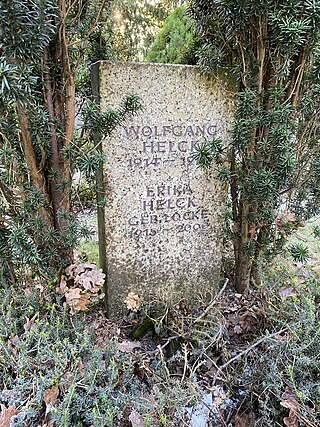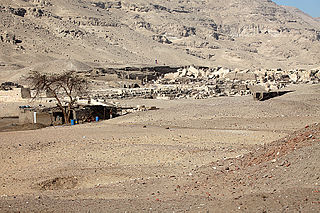
Hatmehit or Hatmehyt was an Ancient Egyptian goddess associated with the city in the Nile Delta known as Djedet or Mendes.

Hans Jakob Polotsky was an Israeli orientalist, linguist, and professor of Semitic languages and Egyptology at the Hebrew University of Jerusalem.
A mammisi (mamisi) is an ancient Egyptian small chapel attached to a larger temple, built from the Late Period, and associated with the nativity of a god. The word is derived from Coptic – the last phase of the ancient Egyptian language – meaning "birth place". Its usage is attributed to the French egyptologist Jean-François Champollion (1790–1832).
Weneg was a sky and death deity from ancient Egyptian religion, who was said to protect the earth and her inhabitants against the arrival of the "great chaos".
The Wörterbuch der ägyptischen Sprache, abbreviated Wb in bibliographic references, is a large German-language dictionary of the Egyptian language published between 1926 and 1961 by Adolf Erman and Hermann Grapow. It is a comprehensive work encompassing 3000 years of linguistic history, including Old, Middle, and Late Egyptian as well as hieroglyphic inscriptions of the Classical Greco-Roman period. The dictionary contains approximately 16,000 headwords in five main volumes, two secondary volumes, and five volumes of primary source references. It is therefore the largest and most complete printed dictionary of Ancient Egyptian in existence.

Hans Wolfgang Helck was a German Egyptologist, considered one of the most important Egyptologists of the 20th century. From 1956 until his retirement in 1979 he was a professor at the University of Hamburg. He remained active after his retirement and together with Wolfhart Westendorf published the German Lexikon der Ägyptologie, completed in 1992. He published many books and articles on the history of Egyptian and Near Eastern culture. He was a member of the German Archaeological Institute and a corresponding member of the Göttingen Academy of Sciences.

The Mokṣopāya or Mokṣopāyaśāstra is a Sanskrit philosophical text on salvation for non-ascetics, written on the Pradyumna hill in Śrīnagar in the 10th century AD. It has the form of a public sermon and claims human authorship and contains about 30,000 śloka's. The main part of the text forms a dialogue between Vasiṣṭha and Rāma, interchanged with numerous short stories and anecdotes to illustrate the content. This text was later expanded and vedanticized, which resulted in the Yogavāsiṣṭha.

Neferkasokar was an Ancient Egyptian king (pharaoh) who may have ruled in Egypt during the 2nd Dynasty. Very little is known about him, since no contemporary records about him have been found. Rather his name has been found in later sources.
Klaus Koschorke is a German historian of Christianity and was a Professor of Early and Global History of Christianity at the University of Munich in Germany from 1993 to 2013.

The Book of Nut is a collection of ancient Egyptian astronomical texts, also covering various mythological subjects. These texts focus on the cycles of the stars of the decans, the movements of the moon, the sun, and the planets, on the sundials, and related matters.

Heidemarie Koch was a German Iranologist.
Thomas Schneider is a German Egyptologist.
Eberhard Otto was a German Egyptologist.
Heiko Steuer is a German archaeologist, notable for his research into social and economic history in early Europe. He serves as co-editor of Germanische Altertumskunde Online.
Karen Radner is an Austrian Assyriologist, the Alexander von Humboldt Professor of Ancient History at the University of Munich.

The Athribis Project is an archaeological and philological endeavour investigating the ruins of the Pharaonic and later Coptic Christian community of the Ancient Egyptian town of Athribis, near to the modern city of Sohag, Egypt. The aim of the project is to fully and thoroughly research, preserve and publish the written records, material technologies and phases of construction of the large temple in the town, which was dedicated to the god Min-Re, his wife Repyt and their son, the child-god Kolanthes.

Antonio Loprieno is a Swiss Italian Egyptologist and Professor of History of Institutions at the University of Basel. From 2005 to 2015, he was rector of the University of Basel. He was also president of the Rectors’ Conference of the Swiss Universities (CRUS) from 2008 to 2015. Since 2018, he has been president of ALLEA, the European Federation of Academies of Sciences and Humanities, and of the Swiss Academies of Arts and Sciences. From December 2019 to December 2020, he was president of the Jacobs University Bremen.
Martin Staehelin is a Swiss musicologist and university lecturer.
Jochem Kahl is a German Egyptologist.

Katja Lembke is a German classical archaeologist and Egyptologist and director of the Lower Saxony State Museum in Hanover.










